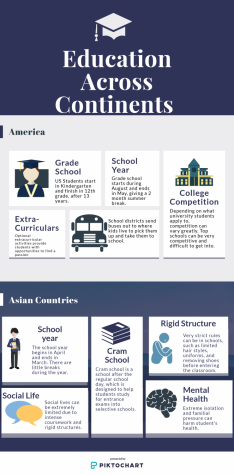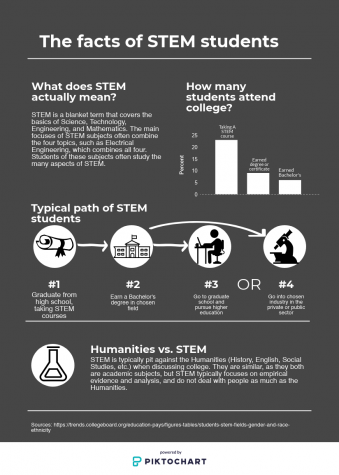The state of STEM
December 10, 2018
Science, technology, engineering, and mathematics (STEM) seem to scare students at NC, and across America. These subjects, perceived as difficult, only interest students who others deem too smart for the general population to understand. A culture of putting STEM majors and jobs on an unachievable pedestal not only damages the numbers of people heading that direction but makes those who choose to pursue the more difficult areas of study feel above the pursuers of liberal arts and traditionally ‘easier’ subjects.

“In America it’s definitely a lot about each person’s identity. You are able to choose what you’d like to, not just what your parents or the society tells you to go to. I think it’s a good thing that people want to go for the subjects that aren’t just the STEM subjects,” AP Calculus and Geometry Support teacher Deepa Stephen said.
America’s education system, in its own unique way, allows for students to pursue what they would enjoy studying, more so than other countries. Places such as Japan or South Korea contain a very rigid education system that forces students into intense competition and hardly leaves them with any free time if the students want to attend higher level schools.

“In India, when I taught there, you could teach in a room of 70+ students and hear a pin drop, because it’s really that silent. Here, we can have a room of 25 students, and you know what will happen. It’s definitely a cultural thing—the parents in India are in big competition; they want the kids to be the best of the best,” Stephen said.
American parental push for education in STEM subjects falters compared to those countries, and in general, parents seem to not care as much about education as parents in Europe or Asia.
“The parents here definitely don’t care about the learning as much as the Indian parents. My sister was really good at writing and language, but my father pushed her to do her undergraduate in chemistry. She was not good at this at all, but she suffered through and now does what she wants with the language side of things. But you can definitely see that push is lacking here; here the success is about how much money you can get. Over there you want education, and how many degrees you have is more of success than a big paycheck,” Stephen said.
It does seem to take a specific type of person to take interest in STEM subjects, though. Mathematics can make the most dedicated students struggle, and without the proper teachers and support, passion for STEM can dissolve before taking a foothold in a student’s brain. Science, built on the natural curiosity of researchers, finds difficult times when that pure passion never appears in students.
“I think it’s hard for some kids to get around that very logical way of thinking, since a lot of STEM is about problem solving. You have the engineers that have to fail 10, 20 times before something sticks and learn from each mistake. It can be harrowing to get super far in a problem you’re working on and have it completely fall apart. It really takes that special type of person,” former Kennesaw State University statistics professor Laura Eshee said.
At NC, with a magnet program for international studies, math-loving students seem few and far between. Those who want to pursue the STEM subjects often attend schools such as Kennesaw Mountain High School, which contains a math and science magnet program. But that does not mean NC completely negates STEM, as NC offers one of the most diverse schools in the county and provides students with different pathways to take.
“I think [NC] hasn’t given me as many opportunities to find my interests, since I didn’t have as many electives open to explore career pathways. I don’t wish I had gone to a STEM magnet, because I think if I had been forced into STEM classes every semester I would have been less enthusiastic about studying it in college. North Cobb has encouraged me to learn a lot in different courses that I wouldn’t have been able to focus on at a STEM magnet, and that I won’t really have time to do in college. So even though I feel like I got a bit of a late start in the field of study I decided to choose, I am glad I got to take a variety of in depth classes to broaden my horizons,” senior Hope Kutsche said.

As America pushes for more intensive education and wants to mirror systems such as those in Finland or Japan, politicians need to realize the benefits of having such a free flow system. One of the most important qualities an education can instill comes from the ability to think for oneself. Producing independent thought in students consistently makes America one of the top places to study and draws foreign students to our universities. Students from places like India, China, Japan, and the United Kingdom all flock to American universities because they offer high quality, necessary education. China even struggles compared to the United States, even though they put more resources into science and technology than America does.
“One of the reasons I stay here is not because so much of the interest in the calculus or math; it’s because the students come here, and are able to think outside the box. Kids in India, they follow the crowd to the end, but here, the kids can really think for themselves. People are always complaining about the American way of education, but in the other countries they look to, the kids go to school, go to the tutoring buildings, and then go home and study. Their brains are mush when they finally hit the bed, but here it’s not like that at all. Kids have lives; they have the sports and the games they want and come with different perspectives. You cannot get that anywhere else, I think,” Stephen said.
American students, because they do not receive that societal push to study STEM subjects, can become the most effective at what they do. Opening the minds of children benefits society in more ways than we see, and continuing to foster that independent growth can keep America as number one going forward.
